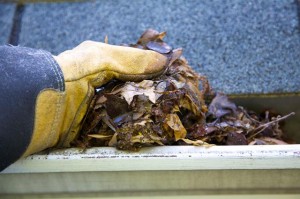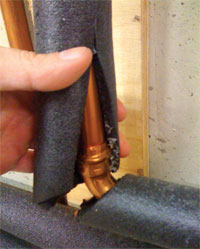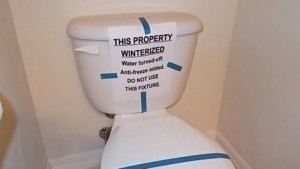As summer becomes a memory and fall comes into full swing, it is time to think about preparing your properties for winter. The Old Farmer’s Almanac is calling for another harsh one, so do you know the tips and tricks to try to help you make it through another frigidly-cold winter with as little issues as possible?
 On the exterior of your property:
On the exterior of your property:
1. Cover any air-conditioners so that you ensure they are protected from the weather and thus will have a better chance of not needing serviced in the spring due to debris etc. getting into the unit.
2. Detach and store away any outdoor garden hoses. Turn the water off to the spigot from the inside of the home, but leave the faucet open on the outside as long as there is no water dripping.
3. Clean the gutters. As we move further and further into the fall there will be more and more leaves and debris hitting the roof and potentially getting into the gutters. Get all of the gutters cleaned out and checked thoroughly for problems so that the water can smoothly move through the system and away from the foundation of your home.
4. Check the roof for problems. While you’re up there cleaning the gutters, why not do a quick visual inspection of the roof to identify any problem areas. Once the weather takes a turn for the worse you will not be able to get someone up there to fix it so you’re better served to have small issues taken care of now before they become any bigger.
 On the interior of your home:
On the interior of your home:
1. Get the furnace checked. Have a HVAC professional come to check the system now before they’re overloaded with no heat calls and you have a hard time getting on the schedule.
2. Check the furnace filter. While you are checking that the furnace is fully operational, also take a look at the furnace filter. Does it need changed? If it does, you might as well do it now since a clogged filter will affect the effectiveness of your furnace. Continue to check the filters every few months to be sure that they aren’t getting clogged and need changed.
3. Insulate those pipes. Do you have exposed pipes that are on the exterior walls of your home or that are subject to the cold air coming in? Insulate them with pipe wrap insulation to prevent them from freezing when the cold temperatures hit.
4. Have the water heater checked. It may need to be flushed to make sure that it will continue to work at peak performance. While you are doing this, do you have a hot water heater blanket on it? This is another good idea to help control your energy consumption costs and allow your water heater to not have to work as hard to keep the water hot.
5. Install storm doors. By removing the screens and installing a storm door you will prevent the cold air from coming in but still allow the light in. Also remove any window screens that you can so that they don’t get destroyed from the harsh winter weather.
6. While you are working on the windows and doors, why not install some plastic and weather-stripping. Not only are both low-cost, but they will help keep the cold air out while still being essentially invisible.
7. Test your smoke and carbon monoxide detectors. This is a good time of year to test them to make sure that the batteries are in good working order and that the units aren’t broke.
8. Check that your basement windows are closed especially the glass block vents. The cold air that comes in through those windows could cause pipes to freeze.
 Do you have properties that will be vacant over the winter? Not sure what to do to winterize them in addition to the normal checklist? Here are a few tips:
Do you have properties that will be vacant over the winter? Not sure what to do to winterize them in addition to the normal checklist? Here are a few tips:
1. Turn the water off at the exterior. Make sure that the water is completely off at the supply and open all of the faucets and drain the waterlines including the toilet. You can also use plumber’s antifreeze to keep the drains from freezing up. DIY Network will explain how to do it.
2. Turn down the thermostat but DO NOT turn the heat off. The temperature should be no lower than 55 degrees to keep everything from freezing up causing you even more problems.
3. Unplug all the appliances once they are cleaned out. If the electric is left on, you can unplug all the electric appliances once they have been cleaned out. No one wants to open a refrigerator to leftover food that’s been sitting with no power for months.
4. Clean out all of the cabinets and remove all the garbage. Do not leave anything in the unit that could be considered appetizing to rodents and pests. While you’re at it, consider leaving insect and rodent repellent under the kitchen sink.
5. Either stop the mail to that unit or go past regularly checking it. As the mail starts to build up that’s a clear sign to thieves that no one is living there and to break in.